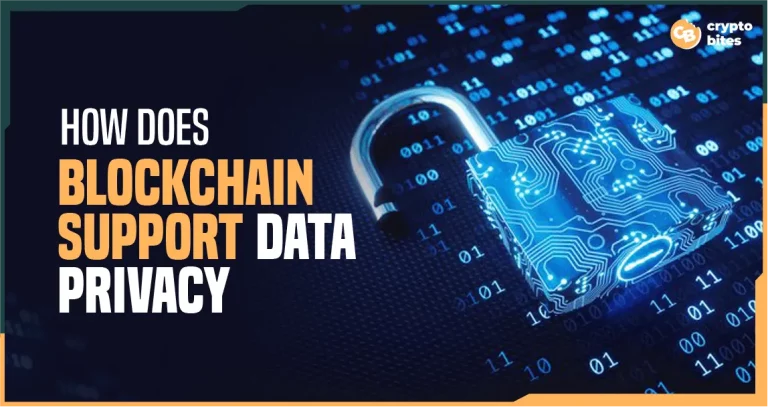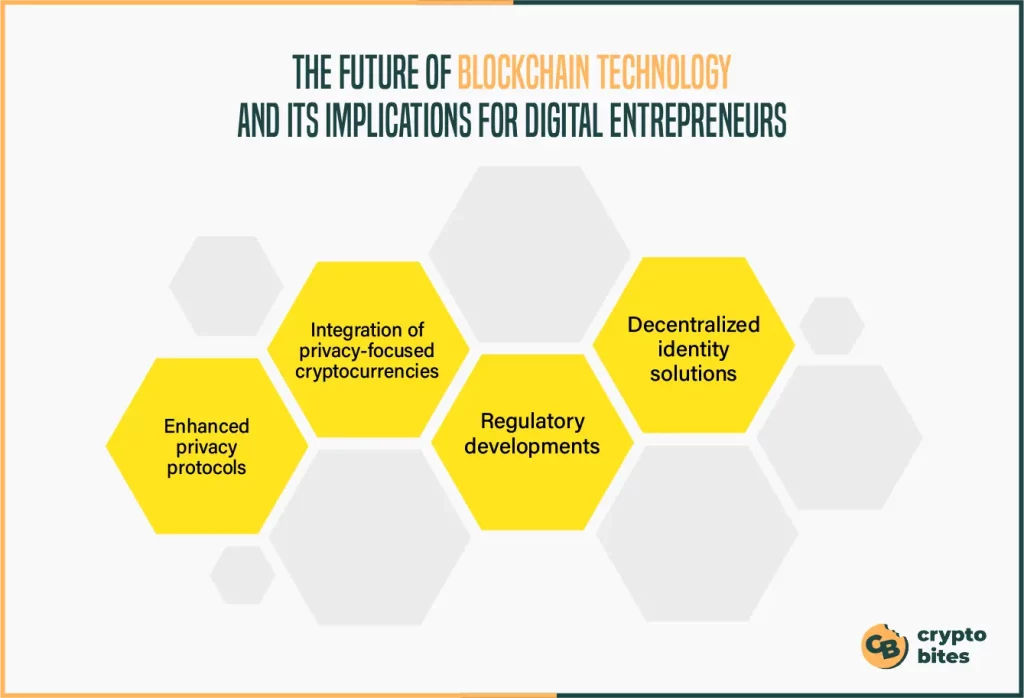
How Does Blockchain Support Data Privacy?
Blockchain and crypto emerged with a core principle in mind: privacy. At a time when banks and financial giants were tightening their grip and cashless systems were on the rise, blockchain offered a glimmer of hope for those seeking financial autonomy without constant surveillance.
Today, blockchain remains one of the most secure technologies, providing a shield against privacy breaches and security threats.
But, how does blockchain support data privacy exactly?
The answer lies in its decentralized structure. By dispersing data across a network of nodes, blockchain makes it incredibly challenging for unauthorized alterations to occur without widespread consensus.
However, this explanation only scratches the surface. For a deeper understanding of how blockchain safeguards your information, check out the rest of the blog.
Key Takeaways
- Blockchain prioritizes privacy, offering an alternative to traditional banking systems.
- Its decentralized structure ensures data security by dispersing information across a network.
- Security measures like decentralization, block hashing, and zero-knowledge proofs enhance privacy.
- Real-world applications include healthcare data protection, secure voting, and ID verification.
- Future advancements in cryptography and privacy protocols aim to bolster blockchain privacy, despite concerns about public and private blockchain vulnerabilities.
Are Leaks and Spying Really that Widespread?
Sadly, it’s hard to measure the full extent of this mess accurately. But online leaks and spying are pretty common. Governments sneakily gather data all the time, even in countries that aren’t outright totalitarian. Take the PRISM program by the US National Security Agency, for instance.

In 2013, Edward Snowden exposed the existence of the PRISM program. Under this program, the NSA collects information from tech giants like Apple, Microsoft, Facebook, and Google, among others. This data can include emails, conversations, videos, logins, and social network activity.
Media coverage of data leaks has increased somewhat. Unfortunately, Internet service providers gather a significant amount of personal information about users for various purposes. Their main goal is often to analyze user habits and potentially upsell goods and services.
One solution to mitigate this is to use a private browser like Sidekick or Brave which helps prevent data collection. However, it’s nearly impossible to completely evade the watchful eyes of digital giants in today’s world.
Moreover, the number of data breaches is increasing in proportion to the amount of personal data being collected. For example, in 2021 alone, information from approximately 1 billion accounts was compromised.
Blockchain, however, can certainly be a solution.
How Does Blockchain Support Data Privacy
Now, onto the nitty-gritty. Blockchain works its magic in a bunch of ways to keep your personal stuff personal. And trust me, it’s a big deal with all the cyber shenanigans going on these days.
1. Decentralization
So, with blockchain security, instead of storing all your data in one central spot like regular databases, it’s more like spreading it out across the board. This setup, called a distributed ledger, needs some special privacy measures to keep things tight.
Now, when it comes to transactions, there’s no hiding. Every move made on the blockchain is public knowledge. Each device connected to the blockchain keeps its own record of every single transaction, kind of like everyone having their own copy of a shared document.
And when a new chunk of data gets added to the chain, it’s not just one device saying “okay.” Nope, the whole crew of devices in the blockchain network has to give it the thumbs-up. It’s like a digital team effort to make sure everything’s legit.
A hacker needs to take over at least 51% of the blockchain in order to alter records within the network, which is extremely difficult.
Nevertheless, this project requires a significant commitment of time and money. If it is successful, the addition allows users to access the data that is recorded on the blockchain.
Overall, this decentralized nature makes blockchain extremely difficult to manipulate and keeps your data secure.
2. Block and Hash
A blockchain consists of a sequence of blocks, with each block containing three essential elements: data or information, the hash of the previous block, and its own block hash.
The block hash serves as a unique digital identifier generated by a cryptographic hash function, providing each block with a distinct fingerprint.
To enhance security and simplify operations, each block also records the hash of the preceding block.
Any alterations to a block result in a change to its hash, rendering all subsequent blocks invalid as they reference different hashes. This mechanism ensures the integrity and immutability of the blockchain.
The use of hashes is indeed a powerful tool for detecting tampering and alterations in blockchain data, thereby safeguarding its integrity and security.
However, advancements in technology have enabled rapid alteration and recalculation of block data, diminishing the effectiveness of this approach. Now, additional measures are necessary to prevent data breaches and address this security concern.
3. Zero-Knowledge Proof
Zero-knowledge proof is a powerful technique used to uphold data privacy within blockchain systems. It enables a party, known as the prover, to demonstrate the validity of a claim to another party, the verifier, without revealing any additional information.
In this scenario, the prover can maintain the confidentiality of their data during a transaction by providing convincing proof of possessing a valid value to the verifier.
Consider the example of someone wishing to prove ownership of a valid credit card for a purchase. Typically, they would need to disclose all the card details, risking the exposure of sensitive information.
This method enables secure purchases while safeguarding the private information associated with the card.
Using zero-knowledge proof tokens, which conceal certain data while facilitating transaction verification, users can conduct DeFi transactions that are untraceable.
The combination of blockchain’s inherent transparency and privacy safeguards creates a dependable environment for sharing information.
Blockchain’s Data Privacy Systems at Work
Blockchain technology is widely used in the healthcare industry to safeguard patient details from prying eyes. In Estonia, a blockchain-based medical records system was introduced in 2019 that gives patients discretion over who can access their personal health information. Patients might feel more at ease knowing their medical data is safe and unchangeable because to blockchain technology.
Blockchain privacy technology can also be applied to enhance voting procedures. For instance, blockchain technology was applied to the 2018 midterm elections in West Virginia, USA. The state was able to guarantee a safe vote count and prevent any tampering with the voting procedure.
Another notable example is the implementation of decentralized ID verification systems. In 2020, the Catalan government in Spain announced the development of an identity verification system based on blockchain technology. This system allows individuals to securely and conveniently confirm their identity.
Furthermore, the World Food Program (WFP) launched the “Building Blocks” initiative in Jordan’s Azraq refugee camp. This project utilizes blockchain technology to manage cash-based payments to refugees. Each refugee is assigned a unique digital identity linked to a blockchain-based system, using biometric authentication such as iris scanning. This system ensures the security of data by recording meal entitlements, transactions, and account balances in an immutable and tamper-proof manner.
Thanks to the blockchain-based solution, WFP circumvented the need for traditional banking systems. This not only reduced expenses but also enhanced transparency and minimized the risk of fraud. Moreover, it provided refugees with a sense of dignity amidst their challenging circumstances by empowering them with secure digital IDs, enabling them to access essential goods with confidence.
Privacy Issues in Public Blockchains
Public blockchains, like Ethereum and Bitcoin, are open to anyone interested in participating, posing certain privacy concerns. Transactions conducted on these public blockchains are highly transparent, potentially allowing malicious individuals to trace activities. Furthermore, these blockchains are vulnerable to 51% attacks, wherein a coalition of miners could seize control of the network, potentially altering transactions.
Security Risks in Private Blockchains
Despite providing a heightened level of data privacy, private blockchains are not immune to security risks. Due to their limited user base managing the network, private blockchains face the danger of centralization. Additionally, these blockchains are susceptible to intrusions or manipulation by malicious insiders, such as authorized users with network access.
Future of Blockchain Privacy
The advancement of cryptographic techniques and privacy-preserving protocols is expected to significantly enhance blockchain privacy in the future.

Innovations such as secure multi-party computation, enabling multiple users to jointly compute functions without revealing their inputs, and homomorphic encryption, facilitating computation on encrypted data without compromising its security, hold promise for bolstering the security of blockchain networks.
Moreover, the emergence of blockchain projects dedicated to anonymity, such as Zcash and Monero, highlights the increasing need for privacy-oriented solutions. As blockchain technology continues to evolve, it is anticipated that more businesses will adopt it to address their privacy concerns and operational challenges.




